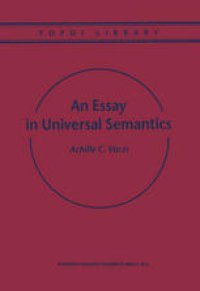
Ebook: An Essay in Universal Semantics
Author: Achille C. Varzi (auth.)
- Tags: Logic, Philosophy of Language, Mathematical Logic and Foundations, Semantics, Theoretical Languages
- Series: Topoi Library 1
- Year: 1999
- Publisher: Springer Netherlands
- Edition: 1
- Language: English
- pdf
Like the journal TOPOl, the TOPOl Library is based on the assumption that philosophy is a lively, provocative, delightful activity, which constantly challenges our inherited habits, painstakingly elaborates on how things could be different, in other stories, in counterfactual situations, in alternative possible worlds. Whatever its ideology, whether with the intent of uncovering a truer structure of reality or of shooting our anxiety, of exposing myths or of following them through, the outcome of philosophical activity is always the destabilizing, unsettling generation of doubts, of objections, of criticisms. It follows that this activity is intrinsically a dialogue, that philosophy is first and foremost philosophical discussion, that it requires bringing out conflicting points of view, paying careful, sympathetic attention to their structure, and using this dialectic to articulate one's approach, to make it richer, more thoughtful, more open to variation and play. And it follows that the spirit which one brings to this activity must be one of tolerance, of always suspecting one's own blindness and consequently looking with unbiased eye in every comer, without fearing to pass a (fallible) judgment on what is there but also without failing to show interest and respect.
This book is a study of the foundations of model-theoretic semantics. Its central thesis is that one does not need to assume a perfect structural fit between languages and their models in order to characterise the basic semantic notions. In particular, truth-value gaps and gluts can be explained away as local phenomena that do not bring logical disaster in their wake. Varzi's detailed and original account is based on a generalisation of supervaluationary techniques and is illustrated with reference to a range of different types of examples, from sentential logic to type theory.
Audience: The book is self-contained and will appeal to philosophers, logicians, linguists and computer scientists.
This book is a study of the foundations of model-theoretic semantics. Its central thesis is that one does not need to assume a perfect structural fit between languages and their models in order to characterise the basic semantic notions. In particular, truth-value gaps and gluts can be explained away as local phenomena that do not bring logical disaster in their wake. Varzi's detailed and original account is based on a generalisation of supervaluationary techniques and is illustrated with reference to a range of different types of examples, from sentential logic to type theory.
Audience: The book is self-contained and will appeal to philosophers, logicians, linguists and computer scientists.
Content:
Front Matter....Pages i-xi
Introduction....Pages 1-5
Foundations....Pages 7-70
Developments....Pages 71-106
Concluding Remarks....Pages 107-114
Back Matter....Pages 115-146
This book is a study of the foundations of model-theoretic semantics. Its central thesis is that one does not need to assume a perfect structural fit between languages and their models in order to characterise the basic semantic notions. In particular, truth-value gaps and gluts can be explained away as local phenomena that do not bring logical disaster in their wake. Varzi's detailed and original account is based on a generalisation of supervaluationary techniques and is illustrated with reference to a range of different types of examples, from sentential logic to type theory.
Audience: The book is self-contained and will appeal to philosophers, logicians, linguists and computer scientists.
Content:
Front Matter....Pages i-xi
Introduction....Pages 1-5
Foundations....Pages 7-70
Developments....Pages 71-106
Concluding Remarks....Pages 107-114
Back Matter....Pages 115-146
....